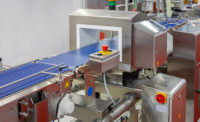Metal object contamination in the meat industry is relatively rare, but it can lead to a disproportionate amount of recalled products. According to 2019 USDA data, recalls for possible presence of metal objects accounted for 34% of foreign matter contamination cases and for 90% of total pounds of recalled meat.
For processors, the best way to minimize the risk of a thousand-pound product recall is to keep metal detectors in optimal conditions with proper maintenance. That will also minimize loss production, protect their investment, and create a safer environment for plant workers.
Planned vs preventive maintenance
Maintenance can be planned or preventive. They have the same objective, but with some important differences.
“Planned or scheduled maintenance is often based on the manufacturer's recommendations that you replace certain parts that are more subject to wear at certain times of the year – for example replacing bearings or changing oil. Preventative maintenance is about preventing the breakdown of components, for example making sure that gaskets around covers are in good order, or that electrical equipment and controls are operating correctly and there's no rust or corrosion,” says Chris Fuller, owner of Fuller Consulting, a food safety and operational consultancy for meat processors.
The other aspect of preventive maintenance, says Fuller, includes calibrating the machine so that it detects the right type of materials for the products. For this type of maintenance, it's important that the maintenance staff understand the different parameters of preset menus.
An indirect approach to preventive maintenance
Unlike planned maintenance, which is tied to a specific schedule, preventive maintenance includes on-going checks to make sure that the equipment is not being affected by anything that would compromise its efficiency now or in the long run.
More importantly, preventive maintenance is not just a series of tasks you perform on the machine; it’s also about how you behave around it.
One example is moisture, the biggest source of problems for metal detectors in processing plants.
“Moisture is constantly being introduced into the processing rooms, whether it's from sanitation, the product, or as a consequence of working on the product. Moisture damages not only mechanical components but also electrical systems, and unfortunately it can't be completely avoided,” says Fuller.
In this case, one aspect of preventive maintenance would include checking that the metal detector is well lubricated, free from rust or other water damage, and all of the rubber gaskets that protect the electrical components are in good repair.
The indirect aspect of it, however, is how you perform sanitation near the machine. Good preventive maintenance measures would be “covering the machine during sanitation or not washing down in that area the same way to avoid splashing, or - if possible - removing electrical equipment from the processing room altogether,” says Fuller.
Another example of this indirect approach to preventive maintenance of metal detectors is the attitude of operators in their daily use. “As an operator, you need to have the mindset of being gentle on the machine to prevent wear, and that often gets lost in processing plants,” says Fuller. “When you are harder on the equipment than the manufacturer recommends you can shorten its lifespan.” IP


